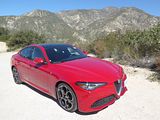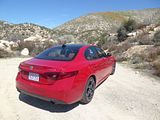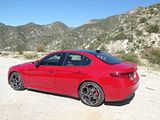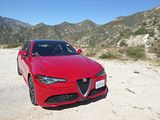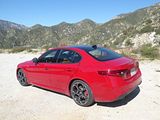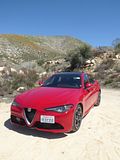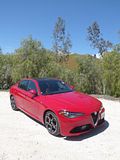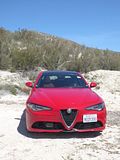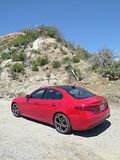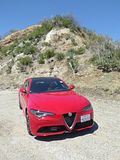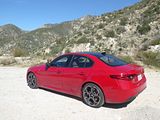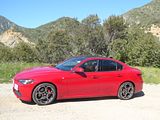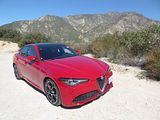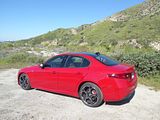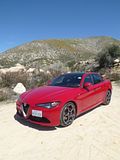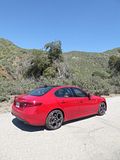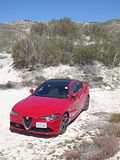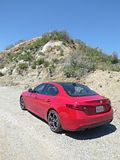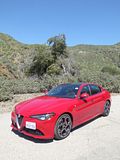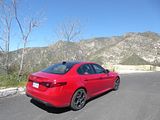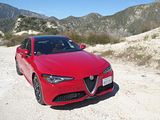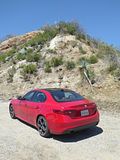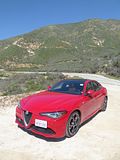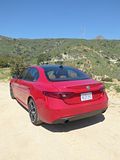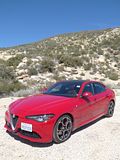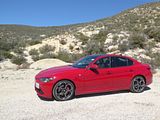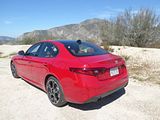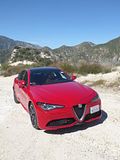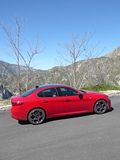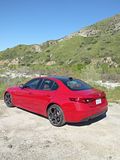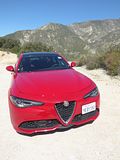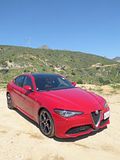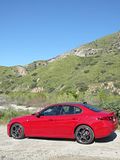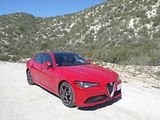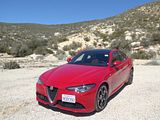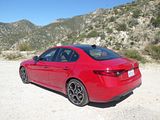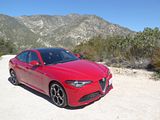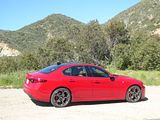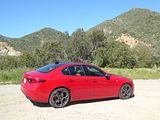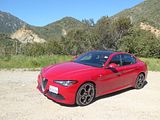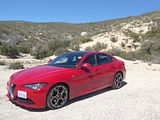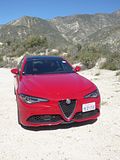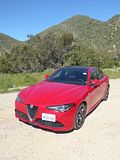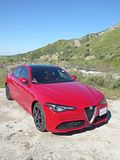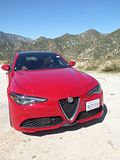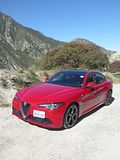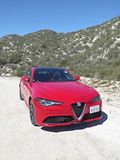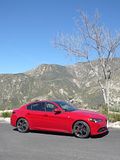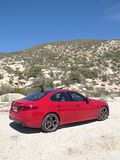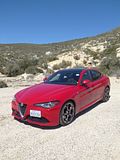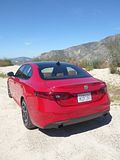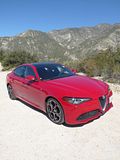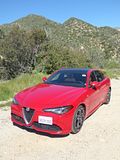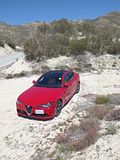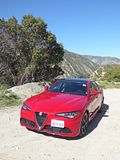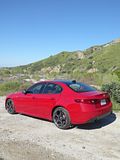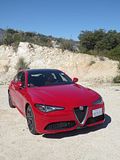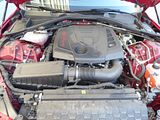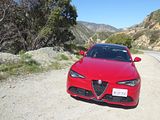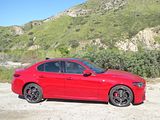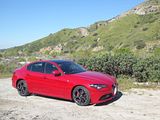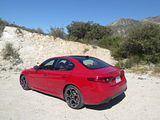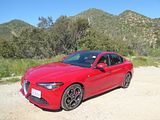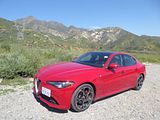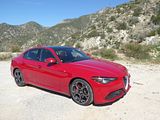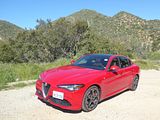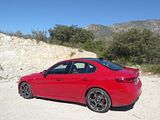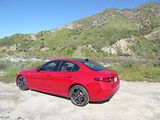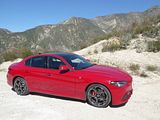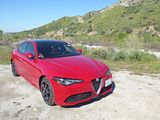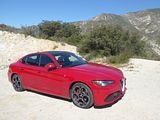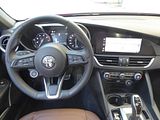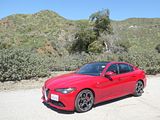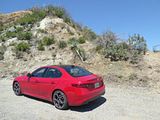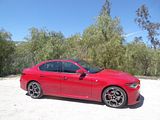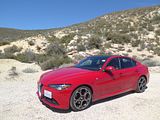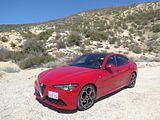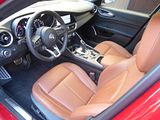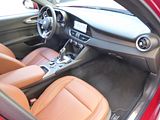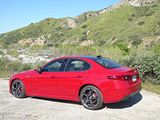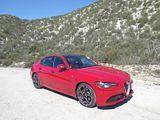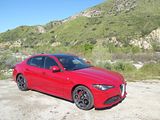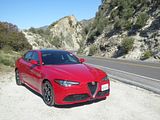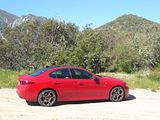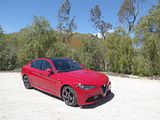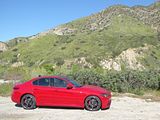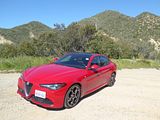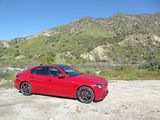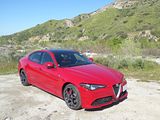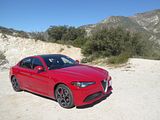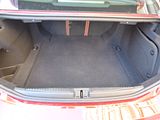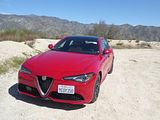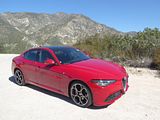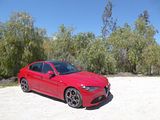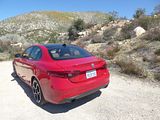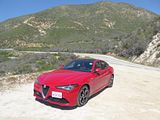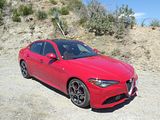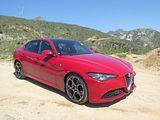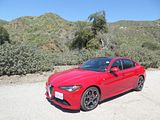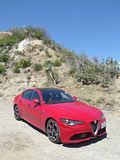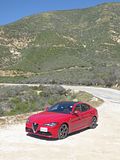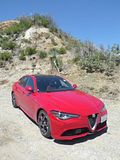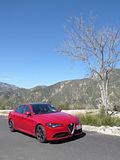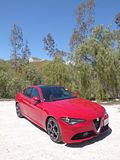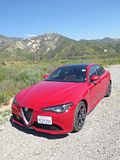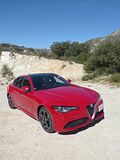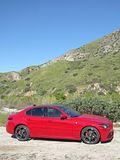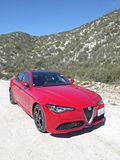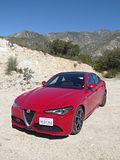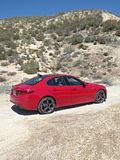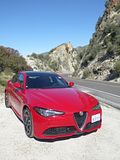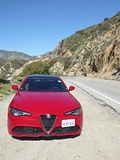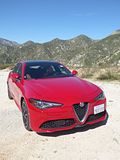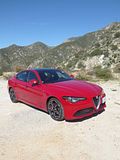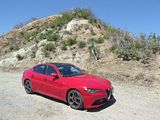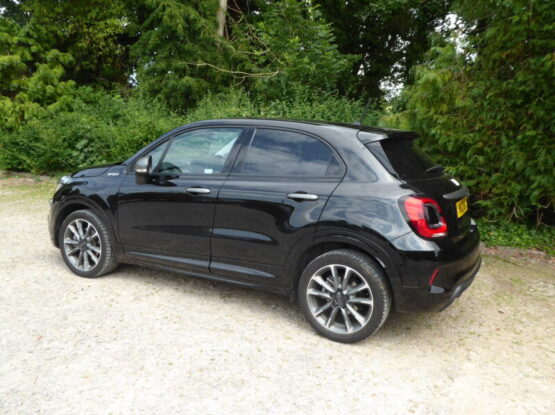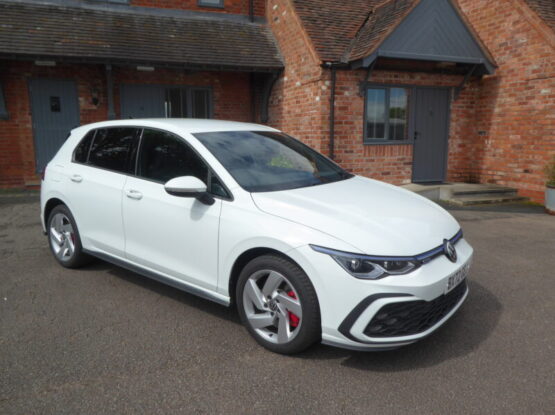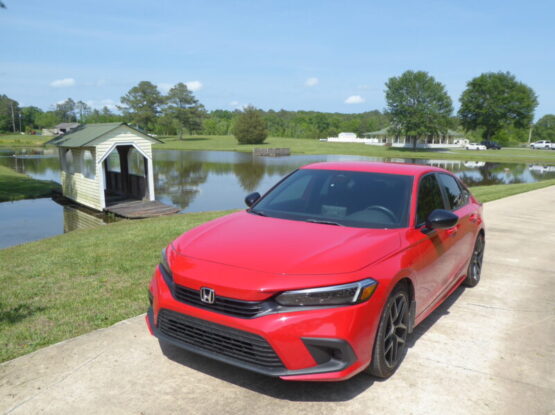It is no secret that I am a huge Alfa Romeo fan. Some years ago, I had a sequence of three of their cars, a 164 2.0TS, a GTV 2.0 TS and a 156 2.5 V6 and I was very sad to see them go at the end of their leases. The only reason I moved away from the brand was that they did not have product for me at the time I was selecting replacement company cars in the late Noughties and early Tens, but when I heard the rumours of what turned out to be Giulia, I got very excited that I could return from the Audi models (which had been excellent, it has to be said) back to an Alfa. The car was not ready in 2012 when I had to order a car and slightly frustratingly although it was premiered in July 2015 for Alfa’s centenary, sales in the UK had still not started in 2016 when I needed to select a new car. I went for a Maserati Ghibli and never regretted it, evidenced by the fact that I bought a second one four years later, but all the time, there was that slightly nagging doubt about whether I should have held out and waited for a Giulia. I managed to drive a Quadrifoglio version in 2018 and it blew me away with how excellent it was even having read countless effusive reviews. That test was in Switzerland, as I had spotted that Hertz had bought some and I went out there specially to drive it and enjoy the Alps. Not surprisingly, Hertz Italia had rather more Giulia on fleet, and so my next chance to drive one came with a car from the other end of the range, an entry level diesel with the manual gearbox that was never offered to UK buyers. I loved that one, too. All the time, I had the feeling that somewhere between these two extremes of the model range was probably the best Giulia of the lot, with the 280 bhp petrol engine, so naturally, I wanted to test one of those. I don’t think I ever imagined that the chance to do so would come in America, but it did. As part of the rebuild of the US rental fleets in the post Covid and chip-supply era, rental car companies bought brands and models that don’t usually feature in their fleets, some of them pre-owned cars and I had spotted that this included both the Alfa Giulia and Stelvio. They clearly did not buy that many, and they are popular, so whenever I had seen them parked up, they were already allocated to someone else, but finally, my chance came on the last day of the first part of my Spring 2023 trip when I was able to secure a car painted in traditional Alfa Red and with a gorgeous tan interior. It looked absolutely fabulous in the strong Californian sunshine, but clearly the real test was going to come behind the wheel. It was a 2022 model year car, with not many miles on the clock and was in Ti spec. Would this prove to be the perfect spec Giulia?
The 2.0 litre four cylinder turbo engine which powers this car is one of many highlights of the Giulia. It has 280 bhp, which means that the car is more than fast enough for ordinary motoring, even if this is not a lot more than half of the output from the Quadrifoglio version. Coupled with an eight speed automatic transmission, which is particularly well matched to the powerplant, the Giulia is just a joy to drive. The car felt very rapid, with punchy acceleration once the turbo kicks in and yet it remained very smooth. You don’t get the sort of raspy exhaust sound that used to characterise Alfa models such as the 164 and GTV Twin Sparks I owned, and indeed the Giulia is generally quiet, perhaps almost too quiet, but it certainly would prove very refined on a longer journey than I was able to undertake. Because I had an evening flight, I had to return the Giulia a little earlier in the day than I usually do, which meant I only covered 145 miles. The car needed 6.4 gallons to fill it, which computes to 22.65 mpg US, or 27.07 mpg Imperial, which is not particularly impressive. However, the trip computer said an average of 27.1 mpg (US). As these systems tend to be quite accurate, I suspect that the Giulia was rather less full on receipt than when I returned it.
To be honest, had I known the fuel economy was not that great, I still would not have cared, as this car is just sublime to drive. The steering is well judged, with plenty of feel, without being unduly heavy, and the handling really is outstanding, with car feeling so well-balanced. There is plenty of grip and no body roll to speak of. The Giulia was an utter joy to drive on the swooping bends of the canyon roads north of LA where I took it. Even though the 225/40 R19 tyres were Run Flats, the ride was also perfectly judged, proving just form enough that car could drive so well but not too firm to make it uncomfortable. The brakes are strong and felt like they would really do their job if called upon for something more challenging than my test conditions. Visibility is generally OK, though the rear ¾ view is a bit challenged. The rear parking camera helps when reversing up, of course.
Alfa Romeo have used some design cues from their back catalogue to go with the needs of a modern car with a lot of warning systems and a touch screen. I think they’ve done pretty well, and I never really had the issue with the quality of the materials or switches that occasioned such negative comment in the reviews. There have been some revisions during the car’s life, and I recognised the gearlever as now being the same as found in my Maserati. The instrument cluster comprises two separate cowled dials, the content of both of which are easy to read. Dot style charts are used for fuel level and water temperature which sit on the outer circumference of the larger speedometer and rev counter. Between the dials is a trip computer display area. I was not a particular fan of the one-touch indicators but they proved easy enough to use, Lights are also operated from the column stalks. There’s a full complement of buttons on the steering wheel boss for cruise control and audio repeaters. The centre of the dash houses what by modern standards is quite a small 8.8” integrated touch screen, operation of which is eased somewhat thanks to a control wheel in the centre console, though there are some functions which this does not encompass. You get all the functions you need here, including an 8 speaker sound system with HD and XM Satellite radio, navigation, Apple Car Play and Android Auto. There is dual zone climate control which is operated with a series of buttons and three dials.
The test car had tan leather seats, and just looking at them was a visual treat, as they real set off the interior well. Sitting on them, with their real leather covering, was just as nice. There is plenty of adjustment on offer, electrically assisted, of course, with movement in 14 different ways for the driver and 12 for the front passenger and there is a three-position memory to store favourite positions. The seats power back when the ignition is off, to aid exit and entry. The seats, as well as the steering wheel are heated. I found there was more than enough headroom even allowing for the fact that there is a nice glass double sunroof fitted as standard in this spec Giulia. The resulting driving position, having adjusted everything was absolutely spot on and the seat proved very comfortable.
Perhaps the only issue which could concern any potential buyer, just as with the Jaguar XE, is the rather tight rear seat accommodation. There is noticeably less legroom available here, even with the front seats set well forward than you will find in an A4, a 3 Series or a C Class. There is a high central tunnel, and the console comes well back, so it would be quite a squeeze for a middle seat occupant. Headroom proved just sufficient for me. There is a drop-down central armrest with cup holders in the upper surface, and there are also a pair of USB ports, rear air vents, map nets on the back of the front seats and door bins.
The boot is similarly modest, proving quite a bit smaller than any of its rivals, but it is a nice regular shape and there is a good sized boot opening. There is a stowage well to one side and a lidded side compartment ton the other. Unlike the Quadrifoglio, the rear seat backrests on this model are fixed, so you can’t extend the capacity, either. Inside the car, things are a little better, with a reasonably sized glovebox, modest pockets on the doors, a central armrest cubby and a stowage recess in front of the gearlever.
The US model range has always been a bit simpler than what has been offered to Europeans. For 2022, American buyers of the Alfa Romeo Giulia have the choice of four trims: Sprint, Ti, Veloce and Quadrifoglio. The Sprint, Ti and Veloce come with a 280 bhp turbo-charged four-cylinder engine and can be had with rear- or all-wheel drive. The Quadrifoglio boasts a 505 bhp twin-turbo V6 and is available exclusively with rear-wheel drive. Both engines are mated to an eight-speed automatic transmission. The entry-level Giulia Sprint rides on 17-inch wheels and features proximity keyless entry, push-button start, a power trunk lid and remote start. Inside, it boasts genuine leather upholstery, heated front and rear seats with 10-way power adjustability and memory settings for the driver’s seat, an auto-dimming rearview mirror, a universal garage door opener and dual-zone automatic climate control. The 8.8-inch touch-screen infotainment system includes navigation, Bluetooth, Apple CarPlay, Android Auto, wireless device charging, satellite radio, HD Radio and an eight-speaker stereo. Standard safety equipment includes forward collision warning, forward automatic emergency braking, adaptive cruise control, blind-spot monitoring, lane-departure warning, automatic high-beam headlights, front and rear parking sensors and a rearview camera. All-wheel drive, rear cross-traffic alert, a panoramic sunroof, a heated steering wheel, a 14-way power-adjustable driver’s sport seat, a 12-way power-adjustable front passenger sport seat and a 14-speaker Harman Kardon stereo are available as cost options. The Ti gains 18-inch wheels and a panoramic sunroof. The available Active Assist Plus package adds driver-attention monitoring, lane-keep assist, traffic-sign recognition and traffic-jam assist. The Veloce rolls on 19-inch wheels and adds a limited-slip rear differential, a 14-way power-adjustable driver’s sport seat and a 12-way power-adjustable front passenger sport seat. All available equipment carries over from lesser trims. The Quadrifoglio is a whole lot more than just a Giulia with a powerful engine. It features an overhauled sport suspension, high-performance Brembo brakes, a torque-vectoring rear differential, a performance exhaust and extra-grippy tyres. It also features a 14-speaker Harman Kardon stereo and rear cross-traffic alert. The Active Assist Plus package is available on the Quadrifoglio as well.
I only had this Giulia for one day, needing to give it back, as I had a flight to Phoenix on which I was booked, but I was awfully tempted simply to eschew that booking and drive the car from LA (it would take about 5 hours by road) and then keep the car for as long as I could. Most rental cars are handed back, with only a few regrets, but every now and then I get one which I really want to jeep. This Giulia is one of those cars. I had high expectations for it, and they were exceeded. It ranks as one of the nest cars I have driven, and whilst a Quadrifoglio is even more fun, the fact that it is a lot more expensive to buy and to run means that the 280 bhp cars are without doubt the sweet spot in a very sweet range. Only the tight rear seat space and relatively small boot count against it, but provided you can like with these, this is most definitely the pick of a very competitive class indeed. The combination of attractive styling, a wonderful engine and outstanding driving dynamics mean that this is perhaps the best car that Alfa have ever made. Let’s hope that they stay on the Hertz fleet and I get to sample one again.


